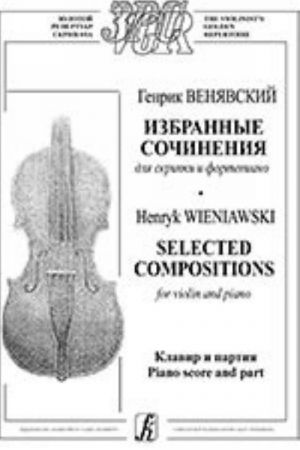Генрик Венявский (1835, Люблин - 1880, Москва) - выдающийся польский композитор и скрипач-виртуоз. Учился в Парижской консерватории, по окончании которой (в 11-летнем возрасте!) был удостоен Большой золотой медали и награды царского двора - скрипки работы Гварнери. С успехом концертировал в России, Германии, Париже, Лондоне. Вторично поступив в Парижскую консерваторию, он блестяще закончил ее по классу композиции. В 1860 году по инициативе А. Рубинштейна был приглашен в Россию на должность придворного солиста (1860-1872), а позднее - на должность первого профессора скрипки Петербургской консерватории (1862-1868). В России написал большинство своих лучших произведений, много выступал как солист-виртуоз и стал фактически одним из создателей профессиональной русской скрипичной школы (наряду со сменившим его в Петербургской консерватории Л. Ауэром и преподававшим в Москве Ф. Лаубом).
Содержание:
Легенда. Op. 17
Скерцо-тарантелла. Op. 16
Каприччио-вальс. Op. 7
Две мазурки. Op. 19
1. Обертас
2. Деревенский скрипач
Воспоминание о Москве. Op. 6
Русский карнавал. Op. 11
Henryk Wieniawski (1835, Lyublin -1880, Moscow) graduated from the Paris Conservatoire at 11 being awarded the Grand Golden medal and the honours of the Court - the Stradivari violin. His tours embraced Russia, Germany, France and London. Having graduated from the Paris Conservatoire for the second time he was recognized as a composer. In 1860 according to A. Rubinstein's initiative Wieniawski was invited to Russia as the court soloist (1860-1872) and later he was engaged to the Petersburgian Conservatoire and started the career of a professor (1862-1868). Russia was the place, where the majority of his compositions were given birth. It was exactly Wieniawski to have founded the Russian violin school (together with F. Laub in Moscow and L. Auer in Petersburg).
1872-1874 - concert tour via the USA together with A. Rubinstein;
1875-1877 - taught at the Brussels Conservatoire. Eugen Ysaye was his disciple, who created new performing violin style. Wieniawski died in Russia during the concert tour. His last words addressed to N. Rubinstein and L. Auer were: "Remember both of you: the Carnival in Venice fades away together with myself." Schumann's "Carnival" symbolized free creativity for any artist of the Romanticism. The personage Paganini was its central figure. Wieniawski was possessed by Beethoven's rebellious individuality, so as "Jacobin Genoese" Paganini. His opuses "Russian Carnival" and "Reminiscence of Moscow" is the result of long-lasting tour via Russia in 1950ies.
Contents:
Legend. Op. 17
Scherzo-Tarantella. Op. 16
Capriccio-Waltz. Op. 7
Two Mazurkas. Op. 19
1. Obertass
2. Country Fiddler
Reminding Moscow. Op. 6
Russian Carnival. Op. 11
Henryk Wieniawski (1835, Lyublin -1880, Moscow) graduated from the Paris Conservatoire at 11 being awarded the Grand Golden medal and the honours of the Court - the Stradivari violin. His tours embraced Russia, Germany, France and London. Having graduated from the Paris Conservatoire for the second time he was recognized as a composer. In 1860 according to A. Rubinstein's initiative Wieniawski was invited to Russia as the court soloist (1860-1872) and later he was engaged to the Petersburgian Conservatoire and started the career of a professor (1862-1868). Russia was the place, where the majority of his compositions were given birth. It was exactly Wieniawski to have founded the Russian violin school (together with F. Laub in Moscow and L. Auer in Petersburg).
1872-1874 - concert tour via the USA together with A. Rubinstein;
1875-1877 - taught at the Brussels Conservatoire. Eugen Ysaye was his disciple, who created new performing violin style. Wieniawski died in Russia during the concert tour. His last words addressed to N. Rubinstein and L. Auer were: "Remember both of you: the Carnival in Venice fades away together with myself." Schumann's "Carnival" symbolized free creativity for any artist of the Romanticism. The personage Paganini was its central figure. Wieniawski was possessed by Beethoven's rebellious individuality, so as "Jacobin Genoese" Paganini. His opuses "Russian Carnival" and "Reminiscence of Moscow" is the result of long-lasting tour via Russia in 1950ies.
Contents:
Legend. Op. 17
Scherzo-Tarantella. Op. 16
Capriccio-Waltz. Op. 7
Two Mazurkas. Op. 19
1. Obertass
2. Country Fiddler
Reminding Moscow. Op. 6
Russian Carnival. Op. 11
Genrik Venjavskij (1835, Ljublin - 1880, Moskva) - vydajuschijsja polskij kompozitor i skripach-virtuoz. Uchilsja v Parizhskoj konservatorii, po okonchanii kotoroj (v 11-letnem vozraste!) byl udostoen Bolshoj zolotoj medali i nagrady tsarskogo dvora - skripki raboty Gvarneri. S uspekhom kontsertiroval v Rossii, Germanii, Parizhe, Londone. Vtorichno postupiv v Parizhskuju konservatoriju, on blestjasche zakonchil ee po klassu kompozitsii. V 1860 godu po initsiative A. Rubinshtejna byl priglashen v Rossiju na dolzhnost pridvornogo solista (1860-1872), a pozdnee - na dolzhnost pervogo professora skripki Peterburgskoj konservatorii (1862-1868). V Rossii napisal bolshinstvo svoikh luchshikh proizvedenij, mnogo vystupal kak solist-virtuoz i stal fakticheski odnim iz sozdatelej professionalnoj russkoj skripichnoj shkoly (narjadu so smenivshim ego v Peterburgskoj konservatorii L. Auerom i prepodavavshim v Moskve F. Laubom).
Soderzhanie:
Legenda. Op. 17
Skertso-tarantella. Op. 16
Kaprichchio-vals. Op. 7
Dve mazurki. Op. 19
1. Obertas
2. Derevenskij skripach
Vospominanie o Moskve. Op. 6
Russkij karnaval. Op. 11













